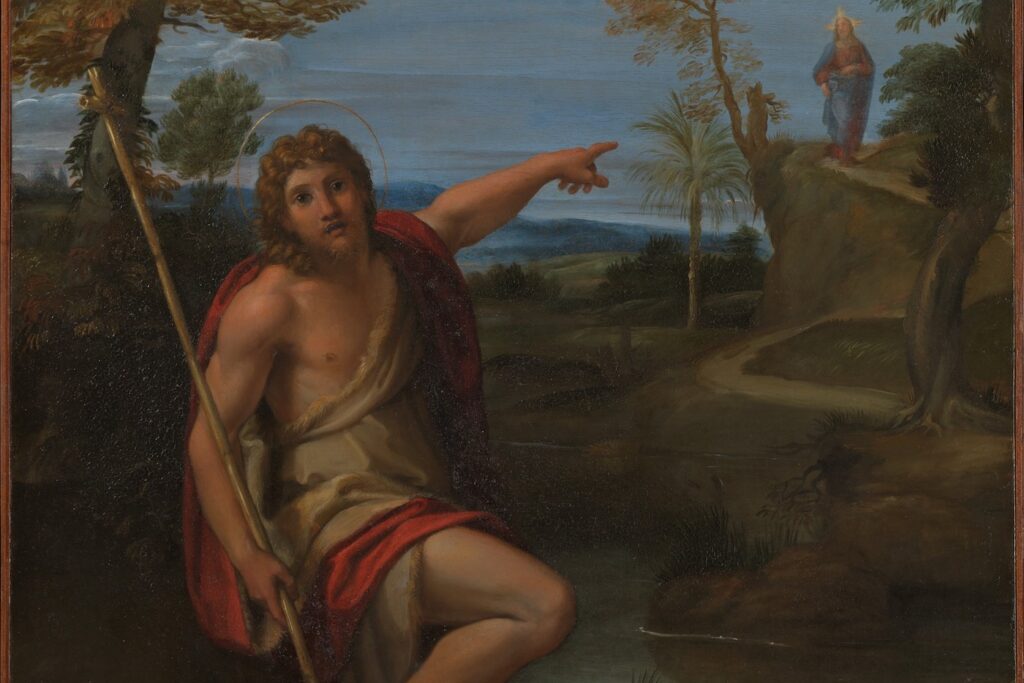It is June, and Pride has flooded the world. Pride is on display in the streets, in stores, in schools, and even at the White House. All of the great and the good (or at least the wealthy, famous, and powerful) are affirming the triumph of the sexual revolution, and some even applaud transgender toddlers and sadomasochism on parade. Affirmation is increasingly mandatory; the devotees of Pride are literally taking away lunch money from low-income children because their Christian school dissents from some aspects of the rainbow creed.
Christians should not be surprised when many of the rich and powerful mock God and scorn His people, and boast of indulging their every material desire and sexual whim. We have been warned about the world and its rulers. But this month also offers us encouragement to resist the depredations of the sexual revolution. June 24th is this weekend, and it is not only the feast day marking the birth of John the Baptist, but also the anniversary of the Dobbs decision that overturned Roe v. Wade’s false declaration that there is a constitutional right to abortion. John the Baptist is an appropriate hero of faith for us this month: he began his life as a witness for the sanctity of unborn life, and ended it as a martyr for marriage.
Before he was even born, John testified to the sanctity of all unborn human life. The sexual revolution requires abortion as a backstop against the consequences of the promiscuity it promotes, but John shows why the personhood of humans in utero cannot be denied without embracing grave heresy about Christ’s nature.
John the Baptist is an appropriate hero of faith for us this month: he began his life as a witness for the sanctity of unborn life, and ended it as a martyr for marriage.
Start your day with Public Discourse
Sign up and get our daily essays sent straight to your inbox.John’s ministry testifying to Jesus began before either was born. According to Luke’s account:
when Elizabeth heard the greeting of Mary, the baby leaped in her womb. And Elizabeth was filled with the Holy Spirit, and she exclaimed with a loud cry, “Blessed are you among women, and blessed is the fruit of your womb! And why is this granted to me that the mother of my Lord should come to me? For behold, when the sound of your greeting came to my ears, the baby in my womb leaped for joy.”
The unborn John’s recognition of the unborn Jesus was a miracle that demonstrates the value of human life in the womb in several ways. First, the passage shows that the fetal John the Baptist and the embryonic Jesus were human persons congruous with their adult selves, and that both were already participating in their divine missions.
Second, the recognition of Jesus as Lord early in Mary’s pregnancy testifies to His divinity even as He grew within Mary’s womb. This divinity at conception is why Christians honor Mary as the Theotokos, the God-bearer. This title is affirmed by Orthodox, Catholic, and Reformed Protestant teaching, and is attested to by many ancient sources, such as Ambrose of Milan’s great Advent hymn, “Veni Redemptor Gentium” (“Savior of the Nations, Come”), which in verses 3 and 4 declares both Jesus’ full divinity and full humanity in the womb.
Third, this episode demonstrates the full humanity of all unborn persons. To claim that the unborn are not fully human is necessarily to claim that Jesus was not fully human while in Mary’s womb. But the Bible insists that His humanity was like ours in every way but sin. Denying the full humanity of the unborn therefore requires either also denying the full divinity of the unborn Jesus (thereby rejecting the reason for the unborn John’s joy and the teaching of the ancient church) or asserting that Jesus’ full divinity was present without His full humanity. Either is an enormous heresy.
Just as the beginning of John’s life shows us the value of unborn human life, the end of John’s life shows us the importance of marriage. At the end of his life John sacrificed himself to bear witness to the inviolability of marriage. As recorded in the Gospel of Matthew, “Herod had seized John and bound him and put him in prison for the sake of Herodias, his brother Philip’s wife,” because John had been saying to him, “It is not lawful for you to have her.” John was then executed at the request of Herodias, after Herod promised a favor to her daughter.
John could have kept quiet on this matter, contenting himself with calls to repentance that did not single out the powerful by name. He could have said that Herod’s sexual conduct was not actually a serious sin worth worrying about, that God doesn’t really care about what people do in the bedroom. He could have chosen to recant in the hope of saving himself after he was imprisoned. But there is no indication that John wavered or doubted his declaration that Herod was wrong to take his brother’s wife for himself.
John took his stand for marriage and fidelity, and he held to this position to his death. And Jesus allowed this martyrdom. Jesus could have told John to ease up in condemning Herod’s sexual sin—that it was not that bad, or even not sinful at all. But Jesus did not do this. Rather, His teachings contain many hard words for us, including condemnations of the sins celebrated by Pride. Jesus calls us in the condition he finds us, but He also calls us to repent of our sins, including sexual ones.
The lurid details of John’s death highlight how sin grows when indulged. Herod did not really want to execute John, but he found himself so entangled by his sins of lust and pride that he felt compelled to add evil to evil by ordering John’s death. And so John the Baptist, the wilderness ascetic whom Jesus declared to be the greatest man born of woman, died as a martyr for marriage.
This is a reminder of how seriously Christianity takes marriage and sexuality. The union of husband and wife is both a symbol of Christ and the church, and the vocation that most of us are called to. Marriage is the basis of civilization and culture in this world, and a sign of our union with God in the world to come.
This should encourage us as we are beset by the celebrants of Pride. The Christian path is the way of Christ, which is almost always contrary to the habits and desires that prevail in our culture. This often means worldly suffering, rather than worldly celebration. But we know that the defense of life, marriage, and chastity is a service to God, and He will ensure that our labor is not in vain.














